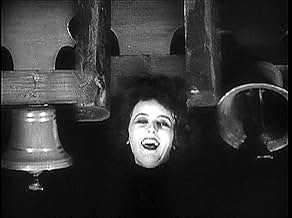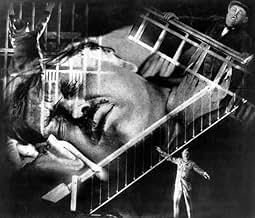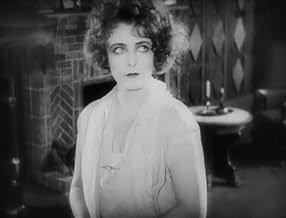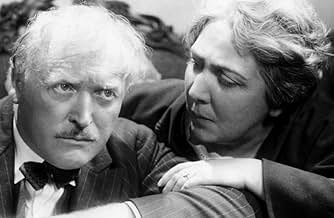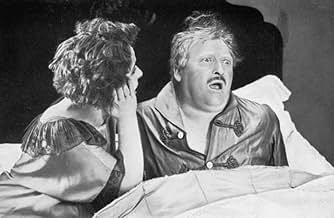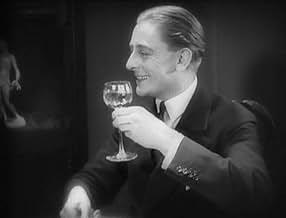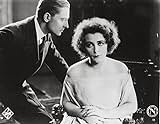IMDb RATING
6.9/10
845
YOUR RATING
A scientist is tormented by an irrational fear of knives and the irresistible compulsion to murder his wife.A scientist is tormented by an irrational fear of knives and the irresistible compulsion to murder his wife.A scientist is tormented by an irrational fear of knives and the irresistible compulsion to murder his wife.
Featured review
Although it has an enormous reputation as a classic example of German Expressionist Cinema, "Secrets of a Soul" turns out to have very few of these pictorial elements. That reputation was obviously built on the opinions of critics who had not actually seen the movie but had referenced the illustration reproduced on the poster. It is not a still from the movie at all, but a composite made up by the publicity department.
Admittedly, we do see the various dreams individuallyand they are even briefly reprizedbut even so, they constitute but an extremely small part of the movie which mostly centers on the well-off but distinctly middle-aged hero's sudden aversion to his young and extremely attractive wife.
I realize that this was obviously not the scriptwriter's intention, as it appears from the flashback that the three participants are roughly the same age. The casting, however, particularly of the 25-year-old Weyher, as well as youngish Jack Trevor, makes nonsense of this supposition. We are forced to accept the movie in the way it appears on the screen, not in the way it was postulated in the minds of the screenwriters.
I suppose you could argue that the dreams are presented in an expressionistic fashion (though I would disagree), but you can't get away from the fact that they display little visual imagination. And in any event, they occupy very little screen time.
As the middle-aged lead, Werner Krauss does extremely well in conveying the domestic disparity he suffers with his young wife. He has obviously been married for at least five or six years and his attitude is not so much loving, as reserved, suspicious, ill-tempered and even resentful. As said, this was probably not the way Neumann and Ross intended, but it's the way Krauss plays the role and, more importantly, the way Pabst has directed it. So what have here is not so much expressionism, as a moderately gripping domestic drama.
Admittedly, we do see the various dreams individuallyand they are even briefly reprizedbut even so, they constitute but an extremely small part of the movie which mostly centers on the well-off but distinctly middle-aged hero's sudden aversion to his young and extremely attractive wife.
I realize that this was obviously not the scriptwriter's intention, as it appears from the flashback that the three participants are roughly the same age. The casting, however, particularly of the 25-year-old Weyher, as well as youngish Jack Trevor, makes nonsense of this supposition. We are forced to accept the movie in the way it appears on the screen, not in the way it was postulated in the minds of the screenwriters.
I suppose you could argue that the dreams are presented in an expressionistic fashion (though I would disagree), but you can't get away from the fact that they display little visual imagination. And in any event, they occupy very little screen time.
As the middle-aged lead, Werner Krauss does extremely well in conveying the domestic disparity he suffers with his young wife. He has obviously been married for at least five or six years and his attitude is not so much loving, as reserved, suspicious, ill-tempered and even resentful. As said, this was probably not the way Neumann and Ross intended, but it's the way Krauss plays the role and, more importantly, the way Pabst has directed it. So what have here is not so much expressionism, as a moderately gripping domestic drama.
- JohnHowardReid
- Apr 18, 2008
- Permalink
Storyline
Did you know
- TriviaSigmund Freud, whose book "The Interpretation of Dreams" largely influenced this film, was approached to serve as a consultant on psychoanalysis. Freud declined, believing that film could not capture the complexities of the science of psychoanalysis.
- Alternate versionsThere is an Italian edition of this film on DVD, distributed by DNA Srl: "I MISTERI DI UN'ANIMA (1926) + OMBRE AMMONITRICI (1923)" (2 Films on a single DVD), re-edited with the contribution of film historian Riccardo Cusin. This version is also available for streaming on some platforms.
- ConnectionsEdited into Die Geschichte des erotischen Films (2004)
Details
- Release date
- Country of origin
- Languages
- Also known as
- Le cas du professeur Mathias
- Production company
- See more company credits at IMDbPro
- Runtime1 hour 37 minutes
- Sound mix
- Aspect ratio
- 1.33 : 1
Contribute to this page
Suggest an edit or add missing content

Top Gap
By what name was Les mystères d'une âme (1926) officially released in Canada in English?
Answer






